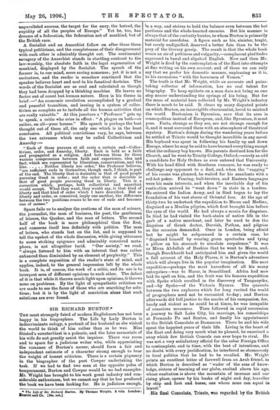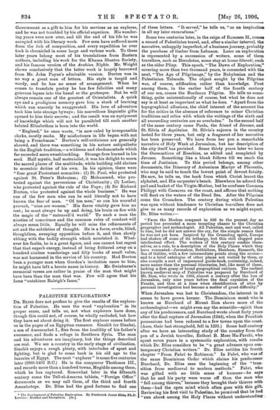SIR RICHARD BURTON.*
THE most strangely fated of modern Englishmen has not been happy in his biographers. The Life by Lady Burton is indiscriminate eulogy, a portrait of her husband as she wished the world to think of him rather than as he was. Miss Stiated's counterblast is a polemic, and the later memorials of his wife do not greatly assist the inquirer. There was room and to spare for a judicious writer who, while appreciating the romance of Burton's career, should form a fair and independent estimate of a character strong enough to bear the weight of honest criticism. There is a certain piquancy in the biographer of the poet Cowper undertaking the task. If we had to find two men at the opposite poles of temperament, Burton and Cowper would be no bad examples. Mx. Wright has brought to his work great industry and con- siderable enthusiasm, but we cannot say that he has produced the book we have been looking for. He is judicious enough, * The Life of SiDU. r Rich Burton. By Thomas Wright. 2 vols. London: Everett and Cio. net ard -1
in a way, and strives to hold the balance even between the hot partisans and the whole-hearted enemies. But his manner is always that of the curiosity hunter, to whom Burton is priniarily material for anecdotes. A figure such as his, sinister, tragic. but rarely undignified, deserved a better fate than to be the prey of the literary gossip. The result is that the whole book wears an air of pettiness and vulgarity,—complacent platitudes expressed in banal and slipshod English. Now and then Mr. Wright is fired by the contemplation of the East into attempts at fine writing on his own account, and of these we can only say that we prefer his domestic manner, unpleasing as it is, to his excursions "with the horsemen of Yemen."
The truth is that Mr. Wright, while an accurate and pains- taking collector of information, has no real talent for biography. To heap epithets on a man does not bring us one step nearer understanding the springs of his being. But for the mass of material here collected by Mr. Wright's industry there is much to be said. It clears up many disputed points on which Burton, an incorrigible obscurantist, loved to mislead the world. Burtonism is Byronism, save that its area is cosmopolitan instead of European, and, like Byronism, it must pose. Facts, strange as they are, are not strange enough for it, and it must surround them with an atmosphere of theatrical mystery. Burton's doings during the wandering years before he settled at Trieste would be thought incredible in any novel. His boyhood was spent in following his family up and down Europe, where he may be said to have learned everything except what the ordinary boy knows. His parents destined him for the Church, and he went to Trinity College, Oxford,—surely as odd a candidate for Holy Orders as ever entered that University. With his head filled with Southern romance, he was ready to challenge any opponent to a duel, and, when the " ragging " of his rooms was planned, he waited for his assailants with a red-hot poker. Fencing, bull-terriers, and Eastern languages were his main interests, and when the inevitable day of his rustication arrived he "went down " in state in a tandem. He entered the Indian Army, and in Sind began to lay the foundation of his vast stores of Oriental lore. At the age of thirty-two he undertook the expedition to Mecca and Medina, disguised as a Muslim pilgrim, which first brought him before the eyes of the world. He had always a mania for disguises. In Sind he had visited the back-stairs of native life in the garb of a native merchant, and later he used to don the disguises of Greek doctor, Dervish, Pathan, and pilgrim as the occasion demanded. Once in London, being afraid lest he might be subpoenaed in a certain case, he "disguised himself by wearing green spectacles and tying a pillow on his stomach to simulate corpulence." It was as Mirza Abdullah of Bushire that he went to Mecca, and, though Burckhardt had anticipated him and given the world a full account of the Holy Places, it is Burton's adventure which will always live in the popular imagination. His next expedition—perhaps the most hazardous of all his many enterprises—was to Harar, in Somaliland. Africa had now laid its spell on him, and the fruit was his famous expedition with Speke which resulted in the discovery of Tanganyika, and—by Speke—of the Victoria Nyanza. The quarrels between the two explorers which for long excited the world of geographers need not be recounted to-day; and Burton afterwards did full justice to the merits of his companion, for, heady and violent as he could be at times, he was incapable of conscious meanness. Then followed in rapid succession a journey to Salt Lake City, his marriage, his consulships at Fernando Po and Santos, and finally his appointment to the British Consulate at Damascus. There he and his wife spent the happiest years of their life. Living in the heart of the East and doing very much what he pleased, he exercised a sway which few British Consuls can ever hope to rival. He was not a very satisfactory official for the sober Foreign Office to contemplate, and in time, with the best of intentions, and no doubt with every justification, he interfered so strenuously in local politics that he had to be recalled. Mr. Wright prints an excellent letter of farewell from an Arab friend, in which Burton is described as "wader of the seas of know- ledge, cistern of learning of our globe, exalted above his age, whose exaltation is above the mountain of increase and our rising place, opener by his books of night and day, traveller by ship and foot and horse, one whom none can equal in travel."
His final Consulate, Trieste, was regarded by the British
Government as a gift to him for his services as an explorer, and he was not troubled by his official superiors. His wander- ing years were now over, and till the end of his life he was occupied with his literary work. Few men have suffered more from the itch of composition, and every expedition he ever took is chronicled in some large and verbose work. To these later years belong most of his translations from Eastern authors, including his work for the Xhama Shastra Society, and his famous version of the Arabian Nights. Mr. Wright shows conclusively that the latter work is largely borrowed from Mr. John Payne's admirable version. Burton was in no way a great man of letters. His style is turgid and wordy, and he has no sense of arrangement. When he comes to translate poetry he has few felicities and many grievous lapses into the banal or the grotesque. But be will always remain one of the greatest of Orientalists. A quick
eye and a prodigious memory gave him a stock of learning which can scarcely be exaggerated. His love of adventure
took him into strange byways ; his marvellous linguistic gifts opened to him their secrets ; and the result was an equipment of knowledge which will not be paralleled till such another belated Elizabethan is born into the world.
"England," be once wrote, "is now ruled by irresponsible clerks, mostly snobs. My misfortunes in life began with not being a Frenchman." Burton's self-criticisms are generally shrewd, and there was something in his nature antipathetic to the English tradition,—a wildness and rhodomontade which far exceeded mere swashbuckling. Strange fires burned in his soul. Half mystic, half materialist, it was his delight to scorn the sacred places of the multitude, while building odd shrines to eccentric deities of his own. In his opinion, there were "four great Protestant sommites (1) St. Paul, who protested against St. Peter's Hebraism ; (2) Mohammed, who pro- tested against the perversions of Christianity ; (3) Luther, who protested against the rule of the Pope; (4) Sir Richard Barton, who protested against the whole business." He was one of the few men who can be said literally not to have known the fear of man. " Of ten men," so ran his scornful proverb, "nine are women." His fierce vitality gave him no rest; he must always be up and doing, his brain on fire with the magic of the " untravelrd world." To such a man the niceties of conscience and the common rules of conduct will always mean little. Equally he will miss the refinements of art and the subtleties of thought. He is a force, crude, blind, thoughtless, sweeping opposition before it, and then slowly ebbing with the bodily strength which nourished it. What- ever his faults, he is a great figure, and one cannot but regret that that superb energy, instead of being frittered away on a hundred aimless wanderings and fifty books of small value, was not harnessed in the service of his country. Had Burton been a younger man when Gordon's invitation came to him, be might have left a heroic name iu history. Mr. Swinburne's memorial verses are rather in praise of the man that might have been than the man that was. Few will agree that his fame "outshines Raleigh's fame."











































 Previous page
Previous page